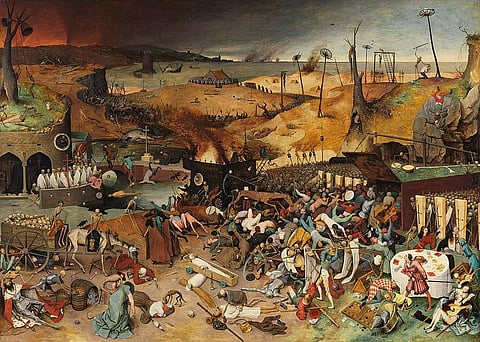

A new book brought out by two United States-based academics – a translation of a work first written 600 years ago – offers a unique, non-Western medieval perspective on the Black Death and pandemics in general.
Merits of the Plague (Penguin Classics, 2023), which hit the stands March 7, 2023, has been billed as the first English translation of the Islamic world’s preeminent meditation on plagues and pandemics.
It was written six centuries ago by Ibn Hajar al-Asqalani, who is otherwise well-known in Arab and Muslim lands for Fath al-Bari, a 12-volume commentary on Hadiths or traditions of the Prophet Muhammad.
Al-Asqalani’s work has been translated from Arabic into English by Joel Blecher, associate professor of history at The George Washington University and Mairaj Syed, professor of Islamic Studies at the University of California, Davis.
“@Professor_MSyed and I spent the pandemic translating this classic Islamic treatise on the plague … It was a quite an experience working on this during the darkest days of the pandemic… we found both incredible affinities across time and the jarring differences,” Blecher stated in a series of tweets recently.
Al-Asqalani (1372-1449) was a medieval polymath. He was an innovative religious commentator, a historian and biographer, a judge on the highest court in Cairo, an author of spiritual poetry, and a textile trader from a powerful family of spice merchants, according to the book’s entry on the portal of the publisher, Penguin Random House.
He was born in 1372 in Cairo, where his parents had moved from Alexandria on the Mediterranean coast. His name means ‘from Ashkelon’ (today in Israel), which is where his family originally hailed from.
Egypt was then part of the Mamluk Sultanate, a powerful Muslim state that also ruled the Levant (Israel-Palestine, Jordan and Syria) and the Hejaz region of the Arabian Peninsula.
The rulers of the state were the Mamluks or freed slave soldiers of Turkic or Circassian descent. The similarly-named Mamluk Sultans of the Delhi Sultanate were also slave soldiers from Turkic lands who had been manumitted and had subsequently assumed power.
The Mamluks of the Middle East ruled from 1250 to 1517 Common Era during which they routed the advancing Mongols in the Battle of Ain Jalut (1260).
The Mongols under Hulagu, grandson of Genghis, had recently destroyed Baghdad, the intellectual and cultural capital of the Islamic World and seat of the Abbasid Caliphs in 1258 CE and ended the Islamic Golden Age.
The Mamluks of the Middle East were eventually succeeded by the Ottoman Empire.
They were in power when the Black Death appeared in Europe, West Asia and North Africa. It lasted from 1346-1353.
A study published in June last year titled The source of the Black Death in fourteenth-century central Eurasia traced the origins of the pandemic to Lake Issyk-Kul in today’s Kyrgyzstan.
The study had noted:
Estimated to have claimed the lives of up to 60% of the western Eurasian population over its eight-year course, the Black Death had a profound demographic and socioeconomic impact in all affected areas, with the European historical record being the most extensively studied resource until now.
Merits of the Plague though shows that the bubonic plague had a huge impact on the medieval Islamic World too. A blurb explains this on the website of Penguin Randomhouse:
Six hundred years ago, the author of this landmark work of history and religious thought—an esteemed judge, poet, and scholar in Cairo—survived the bubonic plague, which took the lives of three of his children, not to mention tens of millions of others throughout the medieval world.
Fajer al-Kaisi, an Iraqi-Canadian actor, has voiced the audiobook of Merits of the Plague. In a sample on the Penguin Random House website, al-Kaisi reads from the introduction written by Blecher and Syed:
Even though many modern readers will associate the Black Death primarily as a moment in medieval European history — and plague literature from the Western canon has returned to our bookshelves and night stands with a vengeance — some of the most profound meditation on the plague were produced arguably outside the West; in the lingua franca of Arabic and in the cultural and intellectual milieu of Islam. Perhaps this is because Muslim writers, whose audiences crisscrossed Africa and Eurasia for trade, study and pilgrimage, were best positioned to grasp the truly global scope of the plague and the moral, theological, political and economic dilemmas it posed.
According to Blecher and Syed, Al-Asqalani’s treatise “wrestles with the origins of the disease, the most effective responses to it and the meaning of suffering and mass death”.
The polymath’s work weaved together “evidence from stories of the Prophet Muhammad and his companions, medical works, law books, anecdotes from first-hand experiences, tales of unseen spirits, death count registers and plague-era poetry that spans eight centuries and the known Muslim world”.
It is both a profound mediation on the plague and a classical anthology of medicine, law, history, traditions and literature about pandemics in the pre-modern world, the translators feel.
They add that Al-Asqalani wrote this short volume to serve an audience coming to terms with the new realities brought about by the plague: widespread death, uncertainity, fear of contagion, the limitations of medicine and crises of faith.
“Just as readers in our own day have turned to The Decameron of (Giovanni) Boccaccio, The Betrothed of (Alessandro) Manzoni and (Daniel) Defoe’s A journal of the Plague year, Ibn Hajar’s book has also garnered renewed interest in the wake of the coronavirus among Muslims as well as among scholars and public intellectuals interested in historical responses to pandemics outside Europe for which few accessible translations on the subject exist,” the introduction adds.